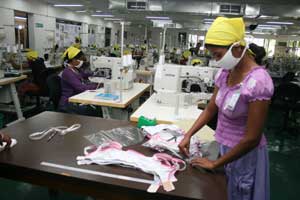
At a local factory |
|
Leading apparel manufacturers and industry experts are advising garment factories, particularly the small and mediums, to inject marketing skills into their companies.
The experts say marketing skills will be essential to survive competition in the coming years. Competition in Sri Lanka’s main garment export markets are set to escalate from next year.
In the US, Chinese competition is expected to increase when quota restrictions on Chinese garment exports come to an end, from the end of this year. Meanwhile, European Union markets are uncertain because of uncertainties on the extension of the GSP+ trade scheme. Therefore, industry experts are recommending that Sri Lankan garment factories arm themselves with marketing competencies to directly sell their services in international markets.
“The next few years will be a harder period. China will be fully liberalised. The prices of oil and raw materials are changing. We are heading into a fibre gap. The US and EU are heading into recession. So the whole price structure is changing,” said Dr Michiel Scheffer, a professor of fashion and textile management at the Saxion University, Netherlands. Dr Scheffer was speaking at an industry workshop titled ‘Beyond GSP+ and the Role of Marketing,’ organised by the Joint Apparel Association Form and the Sri Lanka Apparel Marketers Alumni.
Sri Lanka’s market share in the EU increased over the last year. However, uncertainties over the extension of the GSP+ are expected to erode some of these gains in the coming year. Building marketing capabilities, to bring in buyers, is expected to reduce the slide.
“When a country has a trade concession, like the GSP+, customers will have that country in mind as a destination. But if that is not there, the incentive to come to Sri Lanka would be that much less. So you have to make additional efforts to reach out to customers and you need to have the competencies to do that,” said Chairman-MAS Holdings, Mahesh Amalean. Given the increasing international competition, industry experts maintain that local garment factories need to invest in marketing skills even if trade concessions like the GSP+ are available to the country.
“Buyers expect a lot more from us now. They are less inclined to travel and have less expertise about back-end production aspects than before. So they expect us to bring more to their doorstep,” said Mr Amalean. “It makes no fundamental difference whether the GSP+ is available or not. Marketing is required throughout,” said Dr Scheffer. (DS)
|
